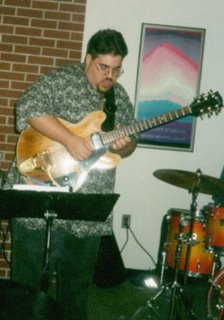
In the comments for Improvisations on a Theme, I came across
Jake Hanlon (there's a blog there, among other things), another guitarist pursuing a master's degree, in this case at the mighty University of North Texas. He earned his undergraduate degree at Saint Francis Xavier University in Antigonish, Nova Scotia, and he now studies and plays at UNT with his brother Josh, a pianist (yes, they both attend UNT and have a group together as well).
What seems immediately good about Jake's situation is that he gigs a whole lot, both with UNT ensembles and his own groups.
His web site also offers
lessons, which I see as another good sign because graduate school, even for music, is not all about performance but equally and often more concerned with pedagogy (i.e. teaching) and research so these guys have the option/chance of a career in academia in addition to performing (and composing, etc.).
I won't go in detail at this point about what I think of studying jazz at the undergraduate and graduate levels because I really don't know enough about it. My own experience with university-level music study was one and a half years in the classical guitar BM program at California State University Northridge. I certainly learned a lot in that time about music, the nature of working hard, and about life in general. One of the things I learned was that I didn't want to pursue a career in music. After a year in, I didn't think I was good enough, and I didn't have enough desire to really commit to music as a career. I also had other interests I couldn't pursue under the crush of music studies.
I considered going into science, but humbling grades in calculus made me think twice about that, and at that point I knew I wanted to study literature and writing, and at the end of my second year at CSUN, I transferred to UC Santa Cruz, eventually graduating with a BA in comparative literature. I've spent time since then at various distances from playing music and have returned somewhat stronger in recent years, more writing about it than doing it, but that's just where I'm at right now. In the early '80s, before CSUN, I played big-band jazz in high school, but my abilities and knowledge regarding improvisation were rudimentary at best. I'm getting there slowly -- make that very slowly -- as a hobbyist now, with my goal to be getting to a level where I'm able to play out a little, whether it's jazz or some other kind of music that fits where I'm at.
But back to graduate school. I do admire these guys, and especially when they supplement their studies with playing gigs, I have a feeling they're headed in the right direction. But jazz in particular is a difficult area of music to pursue. It helps to be really, really good on your instrument, and it doesn't hurt to be able to play all styles and be ready to gig with just about any kind of performer at a moment's notice (I think that's the focus of
USC's Studio/Jazz Guitar program).

